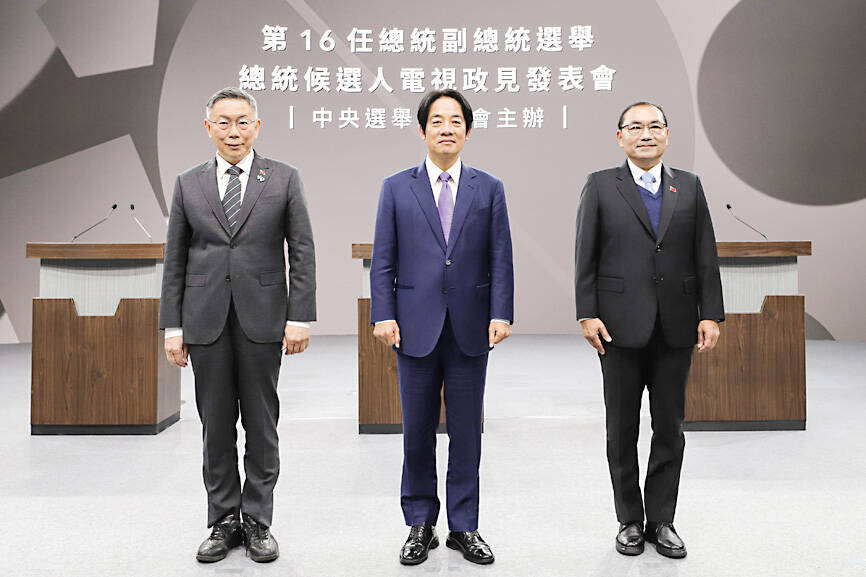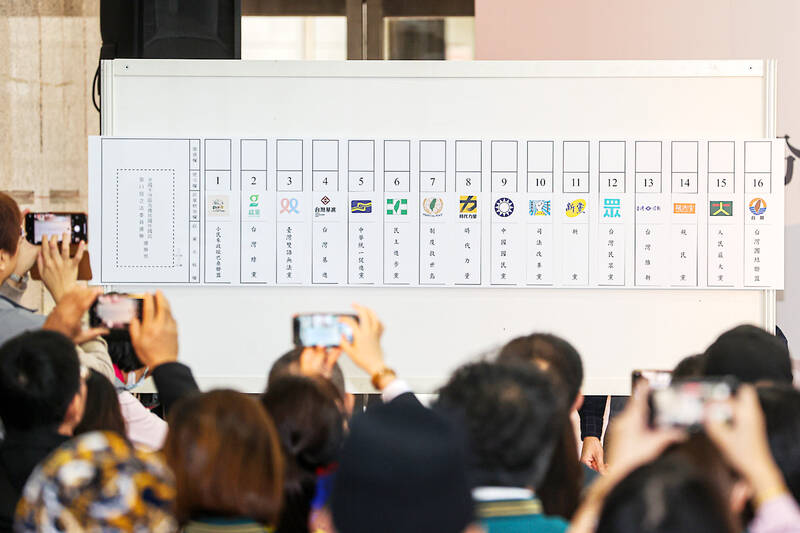The nation’s three presidential candidates yesterday clashed at the first platform presentation organized by the Central Election Commission, with each vowing to secure cross-strait peace and take better care of young people.
New Taipei City Mayor Hou You-yi (侯友宜), the Chinese Nationalist Party’s (KMT) presidential candidate, was first to speak and wasted no time in criticizing Vice President William Lai (賴清德), the Democratic Progressive Party’s (DPP) candidate.
Hou said that he would resume operations at the Special Prosecutors’ Division to investigate allegtions of corruption reported over the past seven years.

Photo: Lo Pei-de, Taipei Times
Hou vowed to uphold the Republic of China Constitution and oppose the independence of Taiwan and China’s “one country, two systems” policy.
He said that Lai has never given up being an independence activist.
He dared Lai to permanently abandon the DPP’s Taiwanese independence guidelines.

Photo: CNA
“Lai pledged to build 130,000 public housing units in eight years, but I think that check is surely going to bounce, because he built none during his two terms as Tainan mayor,” Hou said, adding that he himself had provided housing loans to young people to build families.
Lai criticized Hou and Taiwan People’s Party (TPP) Chairman and presidential candidate Ko Wen-je (柯文哲), saying that neither is fit to protect Taiwan.
“Mayor Hou, you said that you want to protect the Republic of China, but you also accept the so-called ‘1992 consensus,’ about which Chinese President Xi Jinping (習近平) has said is built on the ‘one China’ principle,” Lai said. “That would leave Taiwanese with no say over their future.”
The “1992 consensus,” a term former Mainland Affairs Council chairman Su Chi (蘇起) in 2006 admitted making up in 2000, refers to a tacit understanding between the KMT and the Chinese Communist Party that both sides of the Strait acknowledge there is “one China,” with each side having its own interpretation of what “China” means.
“Chairman Ko, you said that the KMT cannot be trusted because it would quickly lean toward China if it takes office, but the KMT said that you would move much closer to China than it would,” Lai said. “In my opinion, you two are both ‘the pot calling kettle black.’”
Apart from saying that he would spend 3 percent of GDP on national defense, Ko spent the majority of his time addressing domestic issues.
He vowed to restore fiscal responsibility by abandoning special budgets.
“The KMT says that it wants to provide housing loans to young people, while the DPP says it wants to build more public housing and give people more years to pay back loans,” he said.
“I say that the key problem is high housing prices,” Ko said, adding that he would apply his experience in pursuing residential justice as Taipei mayor if elected president.

The CIA has a message for Chinese government officials worried about their place in Chinese President Xi Jinping’s (習近平) government: Come work with us. The agency released two Mandarin-language videos on social media on Thursday inviting disgruntled officials to contact the CIA. The recruitment videos posted on YouTube and X racked up more than 5 million views combined in their first day. The outreach comes as CIA Director John Ratcliffe has vowed to boost the agency’s use of intelligence from human sources and its focus on China, which has recently targeted US officials with its own espionage operations. The videos are “aimed at

STEADFAST FRIEND: The bills encourage increased Taiwan-US engagement and address China’s distortion of UN Resolution 2758 to isolate Taiwan internationally The Presidential Office yesterday thanked the US House of Representatives for unanimously passing two Taiwan-related bills highlighting its solid support for Taiwan’s democracy and global participation, and for deepening bilateral relations. One of the bills, the Taiwan Assurance Implementation Act, requires the US Department of State to periodically review its guidelines for engagement with Taiwan, and report to the US Congress on the guidelines and plans to lift self-imposed limitations on US-Taiwan engagement. The other bill is the Taiwan International Solidarity Act, which clarifies that UN Resolution 2758 does not address the issue of the representation of Taiwan or its people in

SHIFT: Taiwan’s better-than-expected first-quarter GDP and signs of weakness in the US have driven global capital back to emerging markets, the central bank head said The central bank yesterday blamed market speculation for the steep rise in the local currency, and urged exporters and financial institutions to stay calm and stop panic sell-offs to avoid hurting their own profitability. The nation’s top monetary policymaker said that it would step in, if necessary, to maintain order and stability in the foreign exchange market. The remarks came as the NT dollar yesterday closed up NT$0.919 to NT$30.145 against the US dollar in Taipei trading, after rising as high as NT$29.59 in intraday trading. The local currency has surged 5.85 percent against the greenback over the past two sessions, central

US Indo-Pacific Commander Admiral Samuel Paparo on Friday expressed concern over the rate at which China is diversifying its military exercises, the Financial Times (FT) reported on Saturday. “The rates of change on the depth and breadth of their exercises is the one non-linear effect that I’ve seen in the last year that wakes me up at night or keeps me up at night,” Paparo was quoted by FT as saying while attending the annual Sedona Forum at the McCain Institute in Arizona. Paparo also expressed concern over the speed with which China was expanding its military. While the US